Worldwide IT spending is expected to increase this year, but it’s nothing compared to how much money will flow into Big Data. And for employees at those companies, more money is certainly a good thing.
As a new IDC report reveals, spending in the Big Data market will reach $32.4 billion by 2017, or nearly six times the growth rate of the overall IT market.
With billions at stake, much of that money is flowing into Big Data startups, including $900 million to Cloudera just this week. Flush with cash, these startups are hiring like crazy. The perks are good, but they’re not much different from what companies in other hot areas offer, according to Dice.com:
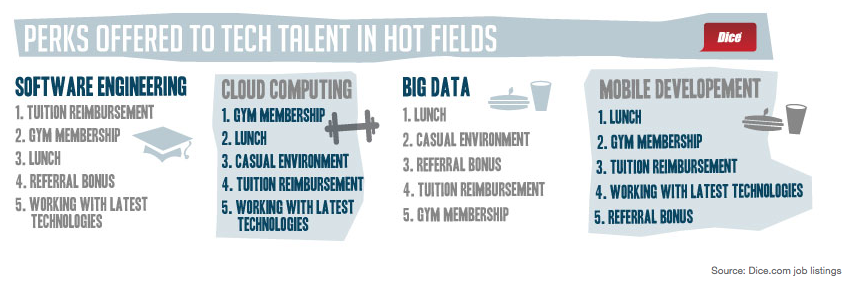
What these Big Data startups offer instead is the chance to completely change the future of how organizations operate. Sounds appetizing, right? But before you submit your résumé, consider what it’s like to work at the 10 most heavily-funded Big Data startups, according to the people that work there. Their views come via the employee reviews on Glassdoor. (Full disclosure: I work at MongoDB, but I included them on the list based on the objective criterion of how much funding these companies have received.)
Here are the top 10 Big Data companies, ranked by employee satisfaction:
DataStax
DataStax is one of the leaders in the emerging database market and the company behind Cassandra, a so-called NoSQL database that was originally developed at Facebook. It’s gets both dings and praise for its “demanding work environment,” though some complain that the company’s distributed employee base means “you have to make an effort to get to know your co-workers.” Given that being “remote is the norm,” you’ll take comfort in knowing that the company includes “the smartest and best group of engineers you will ever work with.”
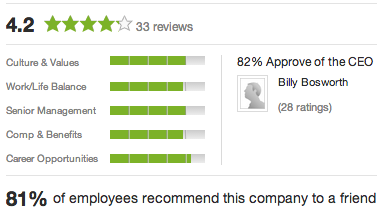
MongoDB
MongoDB offers a document-oriented “NoSQL” database. Mind you, I am an employee of MongoDB, but others have described the workplace as one filled with “generous, good people that work hard, expect much but are also kind,” as well as “passionate, curious, and very smart” people who go[] above and beyond their call of duty to help you. MongoDB gets high marks for being a “leader in a market that is transforming how data is managed.” However, one engineer notes that “All senior leadership positions are filled with outsiders.” This may be getting better as another reviewer indicates that there is more “hiring from within.”
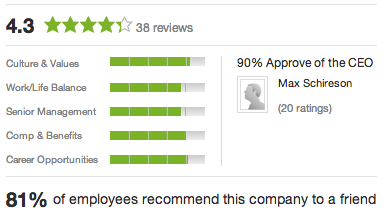
Domo
Domo sells a business intelligence platform that incorporates data feeds from throughout an organization and makes them easily consumable in one place. The company, founded by Omniture founder Josh James, perhaps not surprisingly involves “lots of hero worship,” given James’ outsized personality, and also gets dinged for having a sales-driven culture. Others disagree with these sentiments, declaring Domo to employ the “best talent [they’ve] ever worked with” and an “awesome culture.”
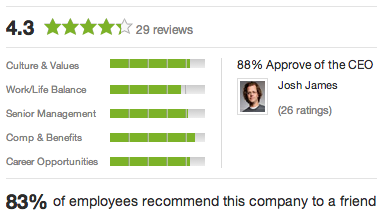
Cloudera
Cloudera offers a Hadoop-based Big Data platform. Employees love the “incredible culture” working alongside the “smartest people in the industry” on a “product that’s changing the world” in a company that maintains “a strong emphasis on remaining an independent company.” Still, some complain about Cloudera, saying it has a “cowboy” culture that forces you to “view co-workers as competition rather than teammates.” But most say the high growth and the problems it engenders are consistent with companies undergoing similar growing pains.
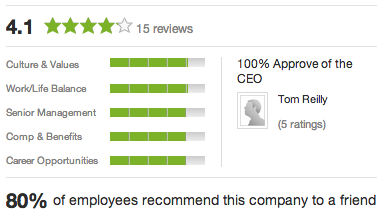
Talend
Talend sells open-source data integration software. The company’s management is lauded for its “open door policy,” which means employees are “able to converse with C-levels and VP’s without intimidation.” Several reviewers cite the company’s focus on growing employees professionally, but the company, which has a significant presence in France, is broadly distributed, causing some reviewers to laud the cultural diversity while others to complain that the “geographical and cultural diversity … can make collaboration and communication a slight challenge sometimes.”
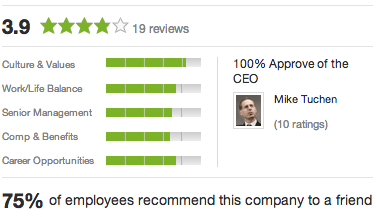
Palantir
Palantir, for the sake of developing analytics applications, puts employees into small teams so people can have “high individual impact” and work on “big, important problems” together. Still, this “smug ‘Our impact on the world is all that matters’ mentality” gets derided for contributing to a “cult-like culture” and leads to the company paying “below-market compensation.”
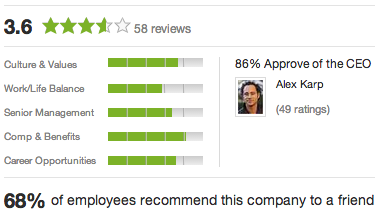
Hortonworks
Hortonworks, like Cloudera, is building a Big Data platform around Hadoop. Reviewers credit the company’s winning strategy around its open-source development and partnerships, though some suggest “the pace and the personal sacrifice required to be successful in an early stage company [including Hortonworks] is not for everybody.” Still, with “great access to senior leadership,” the “internal politics” that several reviewers criticized are manageable.
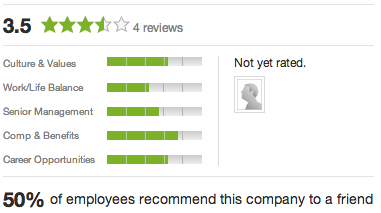
Gauvus
Gauvus builds a Big Data analytics platform. People say the company has the “best idea in terms of big data analytics,” and others gush about the “exciting technology,” but “execution is another thing.” On the execution front, reviewers complain about “fragmented communication” and “rapidly changing priorities.”
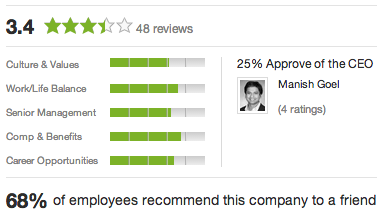
Mu Sigma
Mu Sigma provides a Data-Science-as-a-Service (DSaaS?) product. While the company is one of the lowest-ranked Big Data vendors on the list, some reviewers proclaim it a good place for data geeks, with “opportunity to learn a lot and work on different statistical tools like SAS, R [and] SQL.” However, as far as work-life balance goes, some noted a “lack of diversity” and that “even earned time taken off is sometimes frowned upon and it is really hard to plan personal time.” Furthermore, Mu Sigma was consistently dinged by reviewers for its “low pay.”
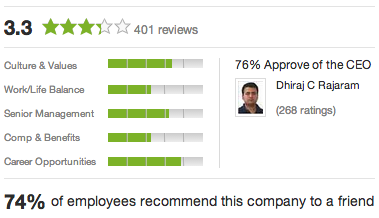
Opera Solutions
Opera Solutions, another Data-Science-as-a-Service (DSaaS) company, ranks lowest among the other Big Data companies on this list. While employees love “the variety and level of clients [Opera Solutions] work with” and a “laid back” management team that’s “not afraid to be experimental,” many others argue that same laid-back management should “resign” because of “policies [that] change all the time” and an inability to “get past fancy marketing and smoke/mirror tactics and simply explain the real value that [the company] provide[s].”
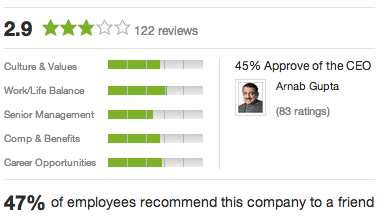
No Bad Choices
While each company has its warts, there are good reasons to want to join any of these companies. Compared to established incumbents, virtually all of these startups rank much higher than their legacy counterparts. Given that pay seems to be good across the spectrum, finding the right company for you may be a matter of finding the right cultural fit.
Image courtesy of Shutterstock





















